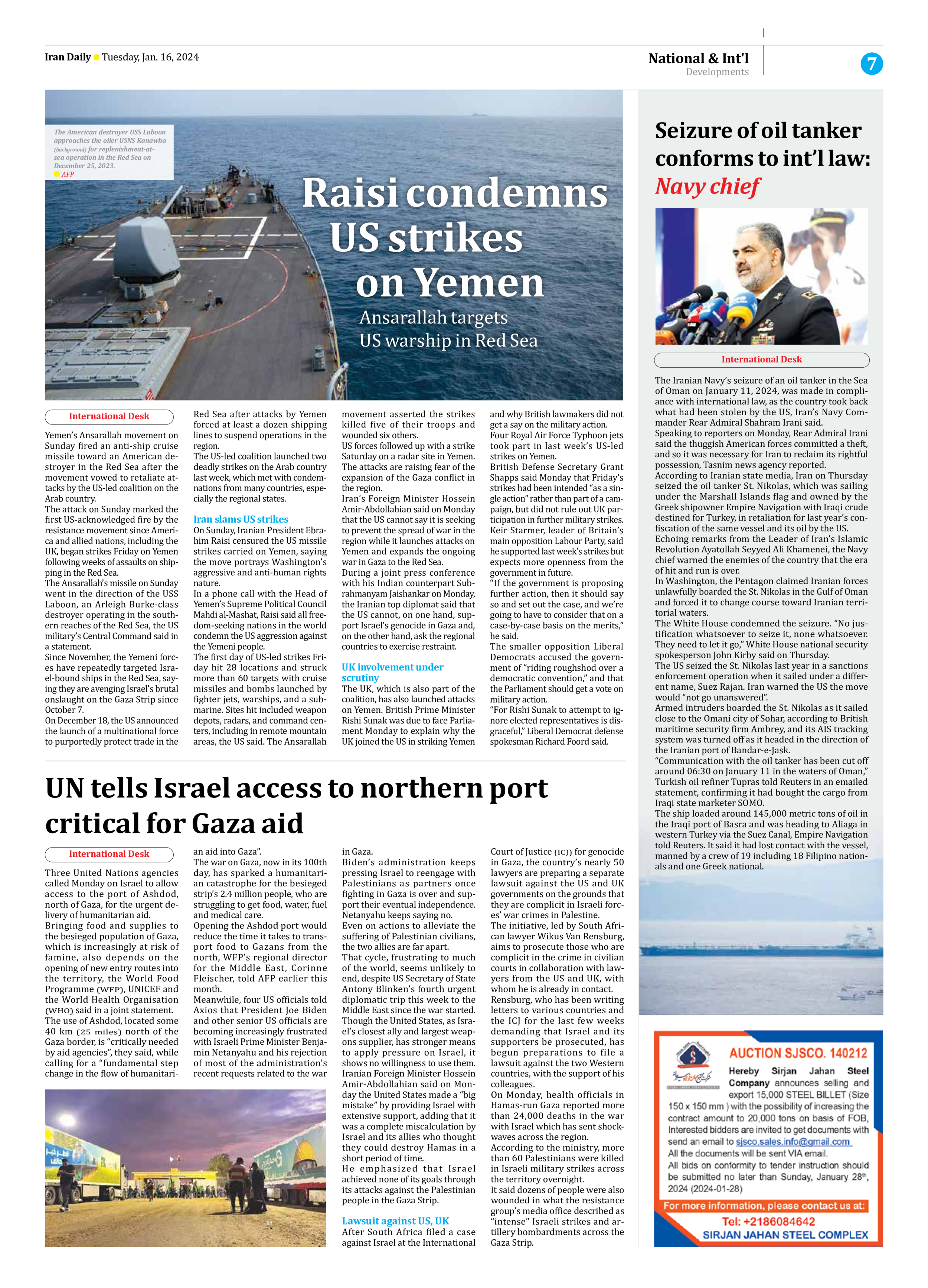
Raisi condemns US strikes on Yemen
Ansarallah targets US warship in Red Sea
Yemen’s Ansarallah movement on Sunday fired an anti-ship cruise missile toward an American destroyer in the Red Sea after the movement vowed to retaliate attacks by the US-led coalition on the Arab country.
The attack on Sunday marked the first US-acknowledged fire by the resistance movement since America and allied nations, including the UK, began strikes Friday on Yemen following weeks of assaults on shipping in the Red Sea.
The Ansarallah’s missile on Sunday went in the direction of the USS Laboon, an Arleigh Burke-class destroyer operating in the southern reaches of the Red Sea, the US military’s Central Command said in a statement.
Since November, the Yemeni forces have repeatedly targeted Israel-bound ships in the Red Sea, saying they are avenging Israel’s brutal onslaught on the Gaza Strip since October 7.
On December 18, the US announced the launch of a multinational force to purportedly protect trade in the Red Sea after attacks by Yemen forced at least a dozen shipping lines to suspend operations in the region.
The US-led coalition launched two deadly strikes on the Arab country last week, which met with condemnations from many countries, especially the regional states.
Iran slams US strikes
On Sunday, Iranian President Ebrahim Raisi censured the US missile strikes carried on Yemen, saying the move portrays Washington’s aggressive and anti-human rights nature.
In a phone call with the Head of Yemen’s Supreme Political Council Mahdi al-Mashat, Raisi said all freedom-seeking nations in the world condemn the US aggression against the Yemeni people.
The first day of US-led strikes Friday hit 28 locations and struck more than 60 targets with cruise missiles and bombs launched by fighter jets, warships, and a submarine. Sites hit included weapon depots, radars, and command centers, including in remote mountain areas, the US said. The Ansarallah movement asserted the strikes killed five of their troops and wounded six others.
US forces followed up with a strike Saturday on a radar site in Yemen. The attacks are raising fear of the expansion of the Gaza conflict in the region.
Iran’s Foreign Minister Hossein Amir-Abdollahian said on Monday that the US cannot say it is seeking to prevent the spread of war in the region while it launches attacks on Yemen and expands the ongoing war in Gaza to the Red Sea.
During a joint press conference with his Indian counterpart Subrahmanyam Jaishankar on Monday, the Iranian top diplomat said that the US cannot, on one hand, support Israel’s genocide in Gaza and, on the other hand, ask the regional countries to exercise restraint.
UK involvement under scrutiny
The UK, which is also part of the coalition, has also launched attacks on Yemen. British Prime Minister Rishi Sunak was due to face Parliament Monday to explain why the UK joined the US in striking Yemen and why British lawmakers did not get a say on the military action.
Four Royal Air Force Typhoon jets took part in last week’s US-led strikes on Yemen.
British Defense Secretary Grant Shapps said Monday that Friday’s strikes had been intended “as a single action” rather than part of a campaign, but did not rule out UK participation in further military strikes.
Keir Starmer, leader of Britain’s main opposition Labour Party, said he supported last week’s strikes but expects more openness from the government in future.
“If the government is proposing further action, then it should say so and set out the case, and we’re going to have to consider that on a case-by-case basis on the merits,” he said.
The smaller opposition Liberal Democrats accused the government of “riding roughshod over a democratic convention,” and that the Parliament should get a vote on military action.
“For Rishi Sunak to attempt to ignore elected representatives is disgraceful,” Liberal Democrat defense spokesman Richard Foord said.







